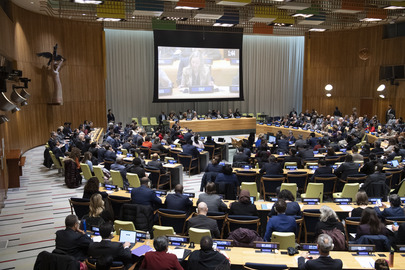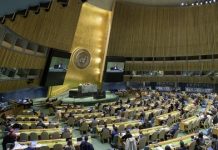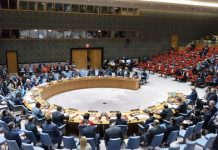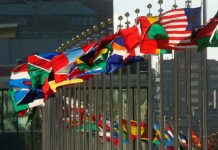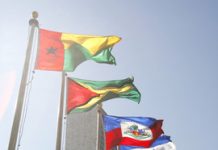Mireille
Pregnant and exhausted and clutching a small bag with all that was left of her belongings, Mireille* stood under the relentless Haitian sun, not sure what to do next.
She had just been deported from the Dominican Republic, a country she had called home since she was eight years old.
Over the years she has seen Haiti, the land of her birth, overcome by gang violence as well as humanitarian, political and economic crises.
Mireille gazes through the protective bars at the GARR facility, reflecting on her journey back to Haiti.
“I was deported to a country I never lived in,” she said, filled with a mix of anger and despair.
The Dominican Republic had been her home for nearly three decades. It was where she built her life, forged relationships and created memories. But overnight, she became an outsider, stripped of her dignity and forced to return to a country she didn’t know.
Mireille’s ordeal began in the early hours of the morning, five days before she crossed the border into Haiti when she was taken to a crowded and uncomfortable detention center, where she stayed for several days before being transported to the border.
A deportation truck arrives at the Belladère border crossing between the Dominican Republic and Haiti.
“I arrived in Haiti feeling scared and unsure of what to do,” Mireille said. “I barely know this country, and I’m struggling to figure out where to start. It’s disorienting and difficult.”
Guerson and Roselène
Guerson and Roselène* had spent over a decade in the Dominican Republic, building their lives in Loma de Cabrera, not far from the border with Haiti.
Guerson worked as a mechanic at a small garage fixing cars, motorbikes, and agricultural equipment. His hands, often smeared with grease, were a source of pride. “People trusted me with their vehicles,” he said. “It was hard work, but I could provide for my family.”
Roselène, meanwhile, managed their modest home. She prepared meals and supplemented the family income by selling patés and fried plantains to neighbours.
A simple life
Their daily life was simple but stable. Their son Kenson attended a local preschool, and Roselène spoke of her pride seeing him learn to write his name.
Then the Dominican authorities arrived. “My children didn’t understand,” said Guerson. “Kenson asked if we were going on a trip. I didn’t know how to answer him.”
The family was herded onto a truck “I held my baby so tightly. I was afraid we wouldn’t survive the journey,” Guerson recalled.
Crossing the border into Haiti felt like stepping into chaos.
The town of Ouanaminthe, already struggling with a sharp increase in deportations, lacked the capacity to respond to the growing crisis.
Families stood on dusty roads, clutching bags and children, unsure of where to go.
“We stood there for hours, lost,” Roselène said. “The children were hungry. I didn’t know how to comfort them because I had nothing left to give.”
Crisis country
Mireille, Guerson and Roselène are just three of the more than 200,000 Haitians who were forcibly repatriated to their homeland in 2024, some 97 per cent of them from the Dominican Republic.
Nearly 15,000 people were returned from across the border in the first two weeks of January alone.
They returned to a country in crisis.
Guerson (left) and Roselène are beginning a new life in Haiti.
Armed groups now control large parts of the country, including key roads in and out of the capital, Port-au-Prince.
The years of violence have displaced over 700,000 people, forcing families into precarious shelters including abandoned schools and churches. In these places, access to food, water and healthcare is limited, leaving many extremely vulnerable.
Nearly 5.5 million people, half of Haiti’s population, require humanitarian aid to survive.
Safety net across the border
Fortunately, when migrants cross over the border into Haiti, they are not alone.
The UN’s International Organization for Migration (IOM) works with the Support Group for the Repatriated and Refugees (Groupe d’Appui aux Rapatriés et Réfugiés, GARR) to ensure the returnees have access to a range of services to meet their immediate needs, including psychosocial support, health referrals, for example pre-natal care, and the distribution of basic items such as clothing, hygiene products, and toiletries.
Temporary accommodation is also available for the most vulnerable, so they can rest and take stock before moving forward with their lives.
IOM staff prepare to assist deported Haitians as they re-enter their home country.
For unaccompanied children, family reunifications are organised and in cases of gender-based violence, survivors are provided with specialised care.
IOM also works with the Office National de la Migration (ONM), Haiti’s government agency for migration.
ONM leads the registration process, ensuring that each individual is accounted for and works with IOM to assess vulnerabilities and provide individual assistance.
The future remains unclear for many returnees in a country where the vast majority of people struggle to get by on a daily basis.
Guerson and Roselène remain somewhat hopeful that they will return to the Dominican Republic someday. “In the meantime, I will find a way to work,” Guerson said softly, his words conveying uncertainty. “I do this for my children.”
*Names have been changed for their safety
Fact box:
The work of IOM as well as GARR and ONM is supported by international donors, including the European Union’s Civil Protection and Humanitarian Aid Operations (ECHO), Global Affairs Canada (GAC), and the Korea International Cooperation Agency (KOICA).
Source of original article: United Nations (news.un.org). Photo credit: UN. The content of this article does not necessarily reflect the views or opinion of Global Diaspora News (www.globaldiasporanews.net).
To submit your press release: (https://www.globaldiasporanews.com/pr).
To advertise on Global Diaspora News: (www.globaldiasporanews.com/ads).
Sign up to Global Diaspora News newsletter (https://www.globaldiasporanews.com/newsletter/) to start receiving updates and opportunities directly in your email inbox for free.


